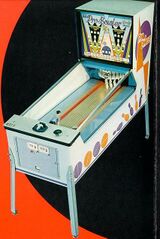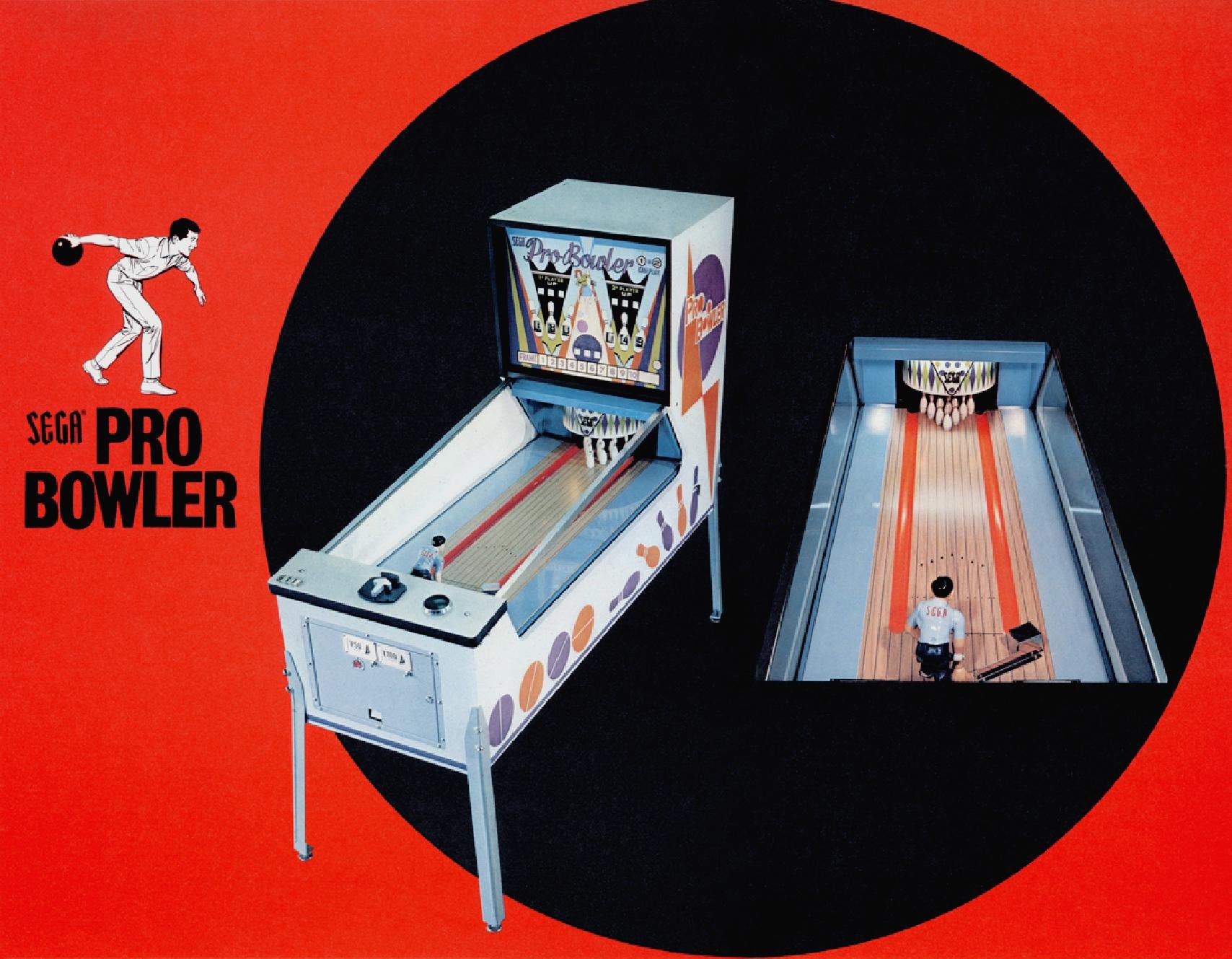Difference between revisions of "Pro Bowler"
From Sega Retro
Scarred Sun (talk | contribs) (Created page with 'frameless|right '''''Pro Bowler''''' is a 1972 two-players electro-mechanical bowling game manufactured by Sega. The game is a mechanically a…') |
m |
||
| (14 intermediate revisions by 5 users not shown) | |||
| Line 1: | Line 1: | ||
| − | [[ | + | {{Bob |
| − | ''''' | + | | image=ProBowler JP front.jpeg |
| + | | publisher=[[Sega]] | ||
| + | | developer=[[Sega]] | ||
| + | | system=Electro-mechanical arcade | ||
| + | | players=2 | ||
| + | | genre= | ||
| + | | releases={{releasesArcade | ||
| + | | em_date_jp=1972{{ref|https://web.archive.org/web/20230819003054/http://thetastates.com/eremeka/1970s.html}} | ||
| + | | em_rrp_jp=180,000{{fileref|1977SegaPriceList JP.pdf|page=7}} | ||
| + | | em_date_us=1972 | ||
| + | }} | ||
| + | }} | ||
| + | {{sub-stub}}'''''{{PAGENAME}}''''' (プロボウラー) is a 1972 two-player electro-mechanical bowling game manufactured by [[Sega]]. The game is a mechanically animated manikin bowling game and basically a copy of Williams' ''Mini Bowl'' (8/70). ''Pro Bowler'' has a five-foot playfield length and scores just like regulation bowling. Relays in this Sega game are the enclosed and socketed variety. Note the drawing date on the schematics for ''Pro Bowler'' is 1972, but reportedly this game was made as late as 1976. Top glass size is 22" x 44.5” x 3/16” tempered glass. It uses one pinball 1 1/4" diameter glass. | ||
| − | The game has a few technical problem (aside | + | The game has a few technical problem (aside from the usual manikin game troubles). One is the transformer is not as robust as American-made games. This is the problem for the G.I. (General Illumination, 6.3 volts). If all the bulbs are installed for the game, only about 4.3 volts is available. As bulbs are removed, the voltage goes up (indicating the transformer can't supply the necessary current to light all the bulbs!) Another problem are the relays themselves. The plug/socket arrangement can be trouble, as the male plugs on the relays turn brown and don't conduct. These can be cleaned though. |
| + | |||
| + | A pre-installed "Medal Out Adapter Box" for ''{{PAGENAME}}'' machines could be acquired for an additional ¥40,000 when purchasing the cabinet from [[Sega Enterprises]].{{fileref|1977SegaPriceList JP.pdf|page=7}} | ||
==Specifications== | ==Specifications== | ||
| − | + | ===Dimensions=== | |
| − | + | {{Dimensions|hi=63|wi=25|di=68|diagramsize=150}} | |
| − | + | ||
| + | ==Promotional material== | ||
| + | {{gallery | ||
| + | |{{gitem|ProBowler EM JP Flyer.pdf|JP flyer}} | ||
| + | }} | ||
| − | == | + | ==Photo gallery== |
<gallery> | <gallery> | ||
| − | + | Probowler machine1.jpg|Marquee | |
| − | + | Probowler machine2.jpg|Marquee detail | |
| − | + | Probowler machine3.jpg|'BUBBA' manikin detail | |
| − | + | Probowler machine4.jpg|Cabinet side art | |
| − | + | Probowler machine5.jpg|Internals | |
| − | |||
</gallery> | </gallery> | ||
| − | + | ==References== | |
| − | + | <references/> | |
Revision as of 23:40, 25 August 2023

| |||||||||||||
| Pro Bowler | |||||||||||||
|---|---|---|---|---|---|---|---|---|---|---|---|---|---|
| System(s): Electro-mechanical arcade | |||||||||||||
| Publisher: Sega | |||||||||||||
| Developer: Sega | |||||||||||||
| Number of players: 2 | |||||||||||||
|
This teeny-tiny article needs some work. You can help us by expanding it.
Pro Bowler (プロボウラー) is a 1972 two-player electro-mechanical bowling game manufactured by Sega. The game is a mechanically animated manikin bowling game and basically a copy of Williams' Mini Bowl (8/70). Pro Bowler has a five-foot playfield length and scores just like regulation bowling. Relays in this Sega game are the enclosed and socketed variety. Note the drawing date on the schematics for Pro Bowler is 1972, but reportedly this game was made as late as 1976. Top glass size is 22" x 44.5” x 3/16” tempered glass. It uses one pinball 1 1/4" diameter glass.
The game has a few technical problem (aside from the usual manikin game troubles). One is the transformer is not as robust as American-made games. This is the problem for the G.I. (General Illumination, 6.3 volts). If all the bulbs are installed for the game, only about 4.3 volts is available. As bulbs are removed, the voltage goes up (indicating the transformer can't supply the necessary current to light all the bulbs!) Another problem are the relays themselves. The plug/socket arrangement can be trouble, as the male plugs on the relays turn brown and don't conduct. These can be cleaned though.
A pre-installed "Medal Out Adapter Box" for Pro Bowler machines could be acquired for an additional ¥40,000 when purchasing the cabinet from Sega Enterprises.[1]
Specifications
Dimensions
Promotional material
Photo gallery
References
- ↑ 1.0 1.1 1977 Sega Price List, page 7
- ↑ http://thetastates.com/eremeka/1970s.html (Wayback Machine: 2023-08-19 00:30)






